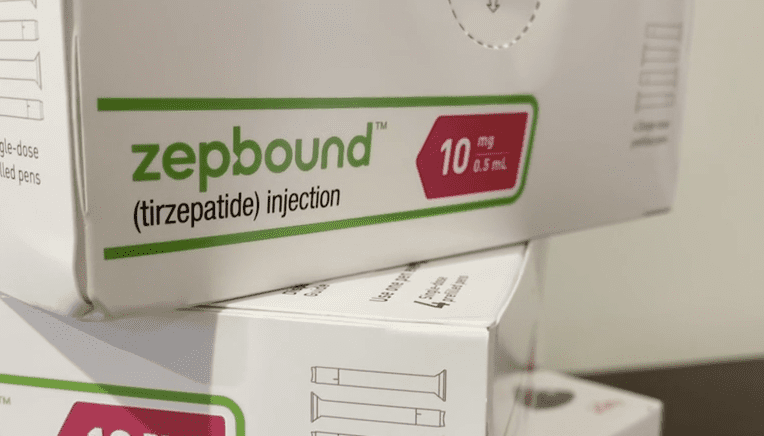In the evolving landscape of obesity management, Zepbound (tirzepatide) has emerged as a significant advancement. Approved by the FDA in November 2023, Zepbound is now available for adults living with obesity or those who are overweight with at least one weight-related condition. This injectable medication is gaining attention for its dual-action mechanism and impressive clinical results, but as with any new treatment, it’s essential to understand its benefits, risks, and how it compares to other options.
What Is Zepbound?
Zepbound is the brand name for tirzepatide, a dual-agonist medication that targets two hormone receptors: GIP (glucose-dependent insulinotropic polypeptide, also known as gastric inhibitory polypeptide) and GLP-1 (glucagon-like peptide-1). By activating these receptors, Zepbound helps regulate glucose and lipid metabolism, enhances insulin secretion, and slows gastric emptying, which helps patients feel fuller for longer periods.
Eligibility for Zepbound:
-
Obesity: BMI of 30 kg/m² or greater.
-
Overweight with comorbidities: BMI of 27 kg/m² or greater plus at least one weight-related condition (e.g., high blood pressure, type 2 diabetes, high cholesterol).
How Does Zepbound Work for Weight Loss?
Zepbound’s dual mechanism is key to its effectiveness. The GLP-1 and GIP hormones are naturally secreted by intestinal cells after meals and play crucial roles in appetite regulation and glucose management. By mimicking these hormones, Zepbound:
-
Reduces appetite
-
Slows stomach emptying
-
Improves insulin sensitivity
-
Enhances lipid metabolism
These actions collectively help patients achieve and sustain significant weight loss.
Clinical Efficacy: How Much Weight Can You Lose?
Clinical trials have demonstrated that Zepbound can lead to substantial weight reduction. In one large trial with over 2,500 adults, participants lost an average of 15% of their body weight, with some achieving up to 22.5%1 %. More recent studies report average weight loss of 26% over 88 weeks, surpassing results seen with semaglutide-based treatments.
However, individual results may vary. As Dr. Katherine H. Saunders, MD, notes, “There’s no one-size-fits-all treatment for obesity. Some individuals will be extremely successful with Zepbound while others might not lose much weight at all.”
Zepbound vs. Other Weight Loss Medications
Zepbound joins a class of medications that includes Ozempic, Wegovy, and Mounjaro. Here’s how it compares:
| Medication | Active Ingredient | Indication | Mechanism | Notable Differences |
|---|---|---|---|---|
| Zepbound | Tirzepatide | Obesity/overweight | GLP-1 + GIP agonist | Dual agonist, higher weight loss |
| Mounjaro | Tirzepatide | Type 2 diabetes | GLP-1 + GIP agonist | Same drug, different indication |
| Wegovy | Semaglutide | Obesity/overweight | GLP-1 agonist | Single agonist |
| Ozempic | Semaglutide | Type 2 diabetes | GLP-1 agonist | Single agonist |
Zepbound and Mounjaro both contain tirzepatide but are approved for different indications. Zepbound is specifically for weight management, while Mounjaro is for type 2 diabetes. Zepbound’s dual-agonist action may also result in fewer gastrointestinal side effects compared to single-agonist drugs like Wegovy and Ozempic.
Administration and Dosage
Zepbound is administered as a weekly subcutaneous injection at home. The starting dose is typically 2.5 mg, which can be increased in 2.5 mg increments monthly, up to a maximum of 15 mg per week. Maintenance doses are usually 5 mg, 10 mg, or 15 mg, depending on individual response and tolerability.
Safety and Side Effects
Zepbound is generally considered safe for most eligible patients, but it is not without risks. Common side effects are gastrointestinal and include:
-
Nausea
-
Diarrhea
-
Vomiting
-
Constipation
-
Abdominal pain
-
Indigestion
Other possible side effects include lethargy, injection-site reactions, and hair loss. More serious but rare risks include kidney or gallbladder problems, serious allergic reactions, low blood sugar, vision changes, and depression or thoughts of suicide. Patients with a personal or family history of medullary thyroid carcinoma (MTC) or Multiple Endocrine Neoplasia syndrome type 2 (MEN 2) should not use Zepbound due to the risk of thyroid tumors.
Long-Term Use and Lifestyle Considerations
Zepbound is not a short-term solution. It is intended for the long-term management of obesity, which is recognized as a chronic disease. Clinical trials show that continued use leads to better weight loss maintenance, patients who stopped Zepbound after 36 weeks regained some weight, while those who continued for 88 weeks maintained more significant weight loss.
Lifestyle modifications remain crucial. Experts recommend:
-
150 minutes of moderate-intensity aerobic exercise per week
-
Strength training at least twice weekly
-
A balanced diet rich in lean proteins and leafy greens
“Lifestyle modifications play a crucial role in overall health, and relying solely on medication without addressing underlying lifestyle factors can limit the medication’s effectiveness,” emphasizes Dr. Jihad Kudsi, MD.
Cost and Insurance
The list price for Zepbound is about $1,060 per month, but actual out-of-pocket costs depend on insurance coverage. Coverage for anti-obesity medications can vary widely, and patients are encouraged to check with their insurance provider for specific details.
Key Takeaways
-
Zepbound (tirzepatide) is FDA-approved for obesity and overweight with comorbidities.
-
It is a dual-agonist drug targeting GLP-1 and GIP receptors, offering a novel approach to weight management.
-
Clinical trials show average weight loss of up to 26% over 88 weeks.
-
Zepbound is administered as a weekly injection, with doses titrated based on response.
-
Common side effects are gastrointestinal, but serious risks are rare.
-
Long-term use and lifestyle changes are essential for sustained weight loss.
-
Cost may be a barrier, and insurance coverage varies.
Conclusion
Zepbound represents a promising option for individuals struggling with obesity or overweight with comorbidities. Its dual-agonist mechanism, robust clinical results, and manageable side effect profile make it a valuable addition to the weight management armamentarium.
However, success with Zepbound, as with any anti-obesity medication, depends on a comprehensive approach that includes healthy lifestyle habits and ongoing medical supervision.















